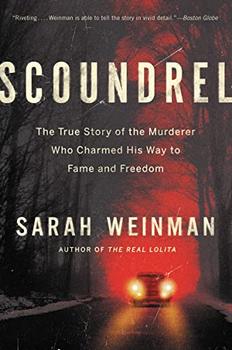Summary | Excerpt | Reviews | Beyond the book | Read-Alikes | Genres & Themes | Author Bio

How a Convicted Murderer Persuaded the Women Who Loved Him, the Conservative Establishment, and the Courts to Set Him Free
by Sarah WeinmanFrom the author of The Real Lolita and editor of Unspeakable Acts, the astonishing story of a murderer who conned the people around him - including conservative thinker William F. Buckley - into helping set him free
In the 1960s, Edgar Smith, in prison and sentenced to death for the murder of teenager Victoria Zielinski, struck up a correspondence with William F. Buckley, the founder of National Review. Buckley, who refused to believe that a man who supported the neoconservative movement could have committed such a heinous crime, began to advocate not only for Smith's life to be spared but also for his sentence to be overturned.
So begins a bizarre and tragic tale of mid-century America. Sarah Weinman's Scoundrel leads us through the twists of fate and fortune that brought Smith to freedom, book deals, fame, and eventually to attempting murder again. In Smith, Weinman has uncovered a psychopath who slipped his way into public acclaim and acceptance before crashing down to earth once again.
From the people Smith deceived—Buckley, the book editor who published his work, friends from back home, and the women who loved him—to Americans who were willing to buy into his lies, Weinman explores who in our world is accorded innocence, and how the public becomes complicit in the stories we tell one another.
Scoundrel shows, with clear eyes and sympathy for all those who entered Smith's orbit, how and why he was able to manipulate, obfuscate, and make a mockery of both well-meaning people and the American criminal justice system. It tells a forgotten part of American history at the nexus of justice, prison reform, and civil rights, and exposes how one man's ill-conceived plan to set another man free came at the great expense of Edgar Smith's victims.
Of course, it is impossible to give a voice back to Edgar Smith's first victim, whose life he stole over six decades ago. But through the tireless work of Sarah Weinman, Scoundrel begins to resolve some of the issues that occur when those who inflict harm are given more attention than those they target. Rather than exploit the suffering of the women hurt by Smith (both of his wives, his mother, the woman he killed, the woman he tried to kill, the girlfriends sprinkled throughout his time in prison), Weinman delicately and deftly elevates their stories with a respect and care that is inspiring to see...continued
Full Review
 (750 words)
(750 words)
(Reviewed by Maria Katsulos).
Sarah Weinman's Scoundrel: How a Convicted Murderer Persuaded the Women Who Loved Him, the Conservative Establishment, and the Courts to Set Him Free sits squarely in one of today's hottest genres: true crime. Consumers of the genre may crave the rush that comes from real-life crime stories, especially ones that prove the cliché that truth can be stranger than fiction. In addition, people are fascinated by the depths and evils of the human mind, as evinced by the success of books based on accounts of true crimes, such as In Cold Blood by Truman Capote and all-time genre bestseller Helter Skelter by Vincent Bugliosi. Norman Mailer's The Executioner's Song won the Pulitzer Prize in 1980.

Although recently re-established ...

If you liked Scoundrel, try these:

by Caroline Fraser
Published 2025
From the Pulitzer Prize–winning author of Prairie Fires comes a terrifying true-crime history of serial killers in the Pacific Northwest and beyond—a gripping investigation of how a new strain of psychopath emerged out of a toxic landscape of deadly industrial violence.

by Candace Fleming
Published 2025
How did Jim Jones, the leader of Peoples Temple, convince more than 900 of his followers to commit "revolutionary suicide" by drinking cyanide-laced punch? From a master of narrative nonfiction comes a chilling chronicle of one of the most notorious cults in American history.